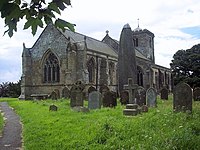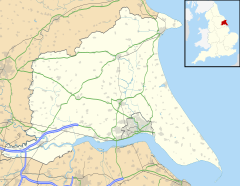Rudston
| Rudston | |
|---|---|
 All Saints Church, Rudston |
|
| Rudston shown within the East Riding of Yorkshire | |
| Population | 409 (2011 census) |
| OS grid reference | TA096676 |
| Civil parish |
|
| Unitary authority | |
| Ceremonial county | |
| Region | |
| Country | England |
| Sovereign state | United Kingdom |
| Post town | DRIFFIELD |
| Postcode district | YO25 |
| Dialling code | 01262 |
| Police | Humberside |
| Fire | Humberside |
| Ambulance | Yorkshire |
| EU Parliament | Yorkshire and the Humber |
| UK Parliament | |
Rudston is a small village and civil parish in the East Riding of Yorkshire, England. It is situated between Driffield and Bridlington approximately 6 miles (9.7 km) to the west of Bridlington, and lies on the B1253 road. The Gypsey Race (an intermittent stream) runs through the village, which lies in the Great Wold Valley. There are a number of Neolithic sites associated with the stream and its valley. It is the current Seat of the Clan Macdonald of Sleat.
According to the 2011 UK census, Rudston parish had a population of 409, an increase on the 2001 UK census figure of 390.
The place-name 'Rudston' is first attested in the Domesday Book of 1086, and means 'rood' or 'cross' stone, referring to the monolith. However, the name 'rud' derives from Old Norse ruð, meaning a clearing or pasture. So the place name could be stone in the clearing, Ruðstane. Nearby Howes of Duggleby and Ba'l (In Ugaritic mythology Baal is the lord of the storm; he bears a mace where Thor will grasp a hammer) also indicate Norse Viking place names rather than Anglo-Saxon origins.
Here stands the Rudston Monolith; at over 25 feet (7.6 m) tall, it is the tallest standing stone in England, and gave the village its name; it is Grade I listed.
Rudston is the centre of an unparalleled grouping of four Neolithic cursus monuments: cursus A, cursus B, cursus C and cursus D. At least one end of each cursus rests on an elevated chalk ridge on the sides of the Great Wold Valley. Cursuses A and C cross the Gypsey Race, whilst the other ends of cursuses B and D probably lie under the village.
...
Wikipedia

